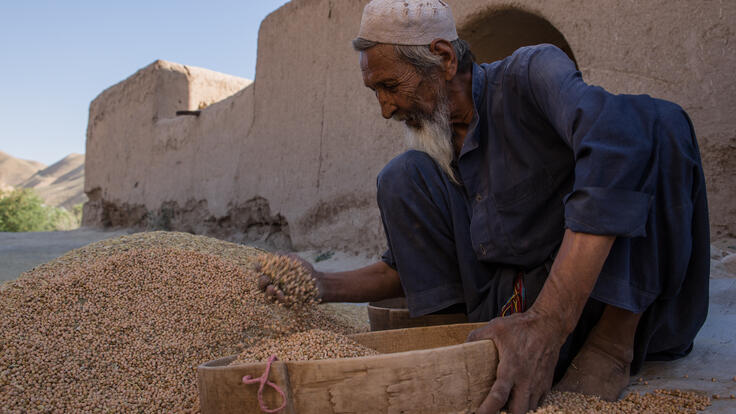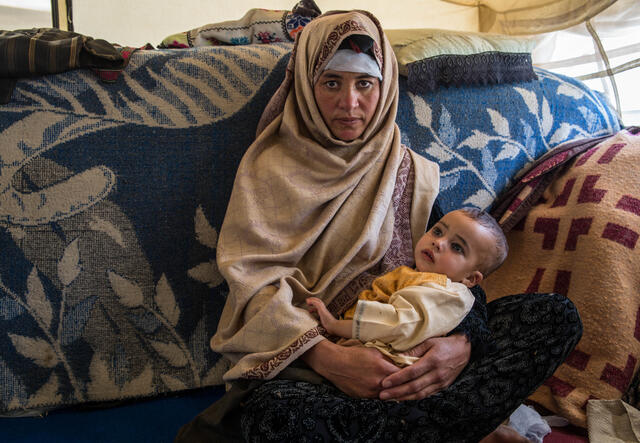What next for Afghanistan? A hunger crisis
We must act quickly to prevent famine in a country where 3.1 million children are already at risk of acute malnutrition.
We must act quickly to prevent famine in a country where 3.1 million children are already at risk of acute malnutrition.
Since the change in government in Afghanistan, a food crisis has been unfolding across the country. Nearly 23 million Afghans are now facing hunger and 1 million children are at risk of dying unless they receive immediate treatment for malnutrition.
“The suspension of aid infusions to the government budget, the freezing of assets, and the uncertainty about sanctions have combined to send the economy into a tailspin,” says David Miliband, president and CEO of the International Rescue Committee (IRC). “The result is a predictable and preventable humanitarian catastrophe.”
Food prices have skyrocketed as the economy collapses, and families cannot afford what they need to survive. Ongoing drought intensified by climate change has also taken a toll on food supplies.
Nearly all Afghans arriving at IRC-run clinics in recent weeks are women bringing their malnourished children for urgent care. Our health teams are seeing a deeply concerning rise in the number of patients with Severe Acute Malnutrition, the most extreme and dangerous form of malnutrition.

In all, some 22.8 million people — more than half Afghanistan’s population — could face acute food insecurity this winter according to the United Nations World Food Program (WFP) and Food and Agriculture Organization (FAO). Of these, 9 million people are projected to face emergency levels of food insecurity, on the brink of famine.
At the same time, public health services are drying up—a result of the pause in international development financing. Sixty percent of Afghan health clinics the IRC assessed do not have the capacity to deliver vital nutrition programs.
Unless people can access the food they need to break the cycle of malnutrition, Afghanistan—which has already endured decades of war—faces the very real risk of famine.
"Almost everyone who is showing up at IRC's clinics are mothers with children who are severely malnourished."
— IRC - International Rescue Committee (@RESCUEorg) November 24, 2021
As more than half the population in Afghanistan faces acute food insecurity and are at risk of famine, watch IRC's Amanda Catanzano on @MTP: https://t.co/sAF5OUaQWP
More funding for frontline humanitarian agencies to scale up health and nutrition programs is urgently needed to save lives. But that’s not enough.
World leaders must act. “Agencies like the IRC have been warning of the humanitarian disaster that awaits us all if the international donors allow the Afghan economy and public health services to implode,” says Miliband. “Now the impending cost of failure is in front of our eyes: 23 million people in a food crisis."

The IRC began responding in Afghanistan in 1988, and now works with thousands of villages across nine provinces, with Afghans making up more than 99% of IRC staff in the country.
Go inside IRC’s work in #Afghanistan—and meet an Afghan mother we’re proud to support—in this @60Minutes clip.
— IRC - International Rescue Committee (@RESCUEorg) December 13, 2021
In their own words, meet two more Afghan mothers and read their stories of hope and hardship, as winter approaches: https://t.co/Abe0ekb8eFhttps://t.co/avgGMG5aSe
We support 62 health clinics throughout Afghanistan, provide cash for displaced families, connect people with livelihoods opportunities, and provide safe learning spaces and community-based education, among other services. We also work with local communities to identify, plan and manage their own development projects. Support our work.
Afghanistan crisis: Learn more
Crisis information: Afghanistan facts l What is happening in Afghanistan? l Crisis outlook
In focus: Women in Afghanistan l How Afghan allies seek safety l Afghan Special Immigrant Visa (SIV) l Climate change impactsHow the IRC helps Afghans:In Afghanistan l In the U.S. l Around the globe
How to help Afghans: In Afghanistan l In your community l Donate to the IRC